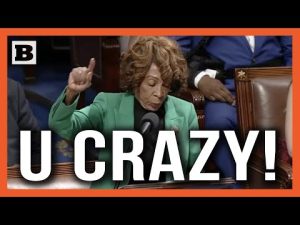**Bud Light’s Bumpy Ride: A Cautionary Tale for Corporate America**
In a world where the stock market is reaching record highs, Bud Light has managed to draw attention for all the wrong reasons. Picture this: a beloved American beer brand, known for its light-hearted ads featuring Clydesdales and a fun-loving spirit, teams up with a social media influencer and suddenly finds itself at the center of a cultural storm. That’s the story of Bud Light’s infamous partnership with Dylan Mulvaney. This collaboration, which some have dubbed a “red pill moment” for consumers, has sparked outrage and resulted in a significant decline in sales and market value.
Once a titan in the beer industry, Bud Light’s value has plummeted nearly 20% since the Mulvaney sponsorship was announced. As the broader stock market surged by almost 40%, Bud Light saw its customer base dip dramatically. Customers voted with their wallets, and this time, they chose to abstain from the “King of Beers.” Not only did Bud Light lose millions of loyal fans, but its parent company, Anheuser-Busch, suffered a staggering loss of around $2 billion in shareholder value. It seems this beer didn’t just miss the mark; it missed the entire target.
Corporate America has never been shy about taking risks, but Bud Light took a dive into the deep end with its divisive Diversity, Equity, and Inclusion (DEI) policies. Big asset managers, like BlackRock and Vanguard, called the shots, pushing corporations to prioritize social issues over their core missions. Unfortunately, Bud Light chose to follow this trend instead of leading it. While other companies decided to take a step back from controversial stances, Bud Light’s decision to embrace an agenda proved detrimental.
What followed was a collective backlash from consumers who found the collaboration with Mulvaney unnecessary and a departure from the brand’s true spirit. The result? A staggering 30% loss in sales. Competing brands that chose to focus on their core missions, like Walmart, reaped the rewards of sticking to their roots while Bud Light and other brands leaning into divisive issues stumbled with lost customers. In the ever-competitive market, it’s clear that divining the customer’s needs and staying true to the brand’s values pays dividends.
The story doesn’t end here. For Bud Light to recover and reclaim its status as the go-to party drink, it will need to confront its missteps head-on. Many argue that redemption lies in recognizing the error of their ways, an act of accountability that could pave the way back into consumers’ hearts. Yet, as the landscape of Corporate America continues to grapple with the fallout from ESG and DEI initiatives, Bud Light’s tale serves as a stark reminder that trends are fleeting, but core values are timeless. In the end, it’s about what consumers want, and it seems they’re thirsty for authenticity, not social statements on their beer cans.
As we watch this unfolding saga, it remains to be seen if Bud Light can turn the tide and learn from its blunders. But one thing is certain: in a market that thrives on connection and tradition, a return to their true roots might just be the recipe for success. With a few lessons learned and a little humility, Bud Light might find its way back to the cooler – where it truly belongs.







